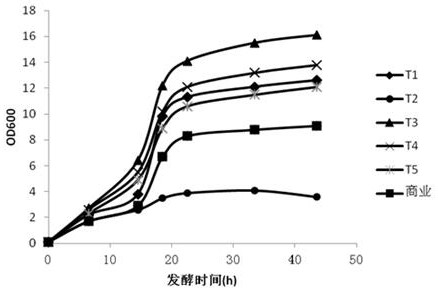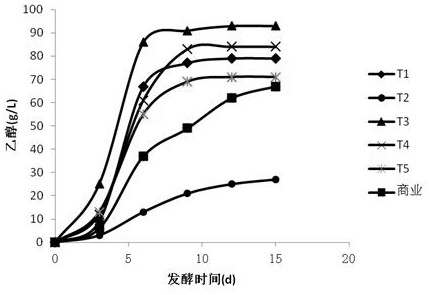Saccharomyces cerevisiae in a kind of kombucha and application thereof
A technology of Saccharomyces cerevisiae and tea wine, applied in the field of microorganisms, can solve the problems of slow growth and low alcohol production, and achieve the effects of fast fermentation, high alcohol conversion rate and unique flavor
- Summary
- Abstract
- Description
- Claims
- Application Information
AI Technical Summary
Problems solved by technology
Method used
Image
Examples
Embodiment example 1
[0022] Take 10 mL of traditional kombucha culture solution, add it into a conical flask filled with 90 mL of sterile saline, shake and mix well. then serially diluted to 10 -4 , take 0.1 mL and spread it on a YPD medium plate containing 1 g / L tea polyphenols, and place it in a 30°C incubator for 2-3 days. Pick the colony with typical characteristics of yeast on the plate, streak and separate more than 3 times, and obtain 47 strains. The strains isolated by streaking were observed under a microscope, and yeast strains with budding from one or more ends were screened out, and 23 strains were obtained. The strains selected by microscopic examination were inoculated on WL nutrient agar medium, and cultured in a 30°C incubator for 5 days. The color of the colony was cream (milky white), the surface was smooth, the spherical convex, opaque, and creamy strains were screened out, and 6 strains were obtained. The obtained strains were inoculated in YPD liquid medium and cultured in ...
Embodiment example 2
[0026] The strains screened in Example 1 were compared with the growth of commercial active dry yeast in seed medium. Firstly, 100 μL of the bacterial solution was taken from the glycerol tube and inoculated into 50 mL of YPD medium, and cultured at 30 °C and 200 rpm for 24 h. Take 2 mL of the cultured bacterial solution, inoculate it into 50 mL of seed medium, and cultivate it at 30 °C and 200 rpm. Samples were taken at 0 h, 6.5 h, 14.5 h, 18.5 h, 22.5 h, 33.5 h, and 43.5 h of culture, and then diluted to an appropriate multiple to measure the absorbance at a wavelength of 600 nm. Taking time as the abscissa, OD 600 As the ordinate, draw the growth curve, such as figure 1 shown. Depend on figure 1 It can be seen that the yeast gradually enters the logarithmic phase after 6.5 h, and grows faster. In the seed medium, the yeasts T1, T3, T4, and T5 grew better, and the bacterial concentration was significantly higher than that of the commercial yeast. In addition, the gro...
Embodiment example 3
[0029] The bacterial strain screened out by the embodiment case 1 is compared with the commercial active dry yeast in the black tea wine medium. Take 40 mL of cultured seed medium and inoculate it into a beaker containing 1 L of black tea wine medium, seal it with gauze, and culture it in a constant temperature incubator at 25 °C. The alcohol content was measured every 3 days, and the results were as follows: figure 2 shown. Depend on figure 2 It can be seen that compared with other strains, yeast T3 produces alcohol at a significantly faster rate, and the alcohol yield is also higher. In addition, the tea wine brewed with yeast T3 can well preserve the flavor of the tea itself and has a rich taste.
[0030] Black tea wine culture medium: leaching at 100°C for 110 min at a tea-to-water ratio of 1:90, and then adding 150 g / L rock sugar. The tea leaves are Keemun black tea, purchased from the Keemun tea factory.
[0031] Therefore, taking the yeast ( Saccharomyces cerevi...
PUM
 Login to View More
Login to View More Abstract
Description
Claims
Application Information
 Login to View More
Login to View More - R&D
- Intellectual Property
- Life Sciences
- Materials
- Tech Scout
- Unparalleled Data Quality
- Higher Quality Content
- 60% Fewer Hallucinations
Browse by: Latest US Patents, China's latest patents, Technical Efficacy Thesaurus, Application Domain, Technology Topic, Popular Technical Reports.
© 2025 PatSnap. All rights reserved.Legal|Privacy policy|Modern Slavery Act Transparency Statement|Sitemap|About US| Contact US: help@patsnap.com


